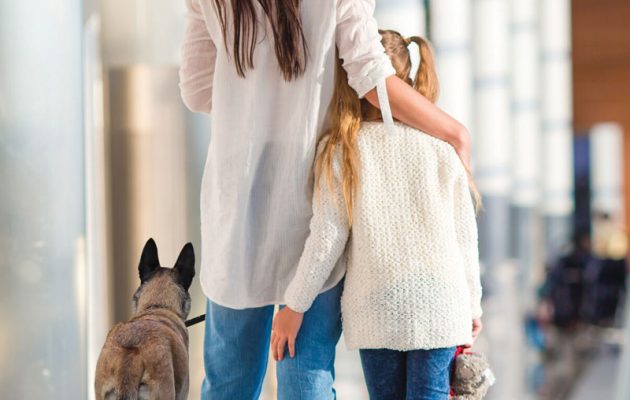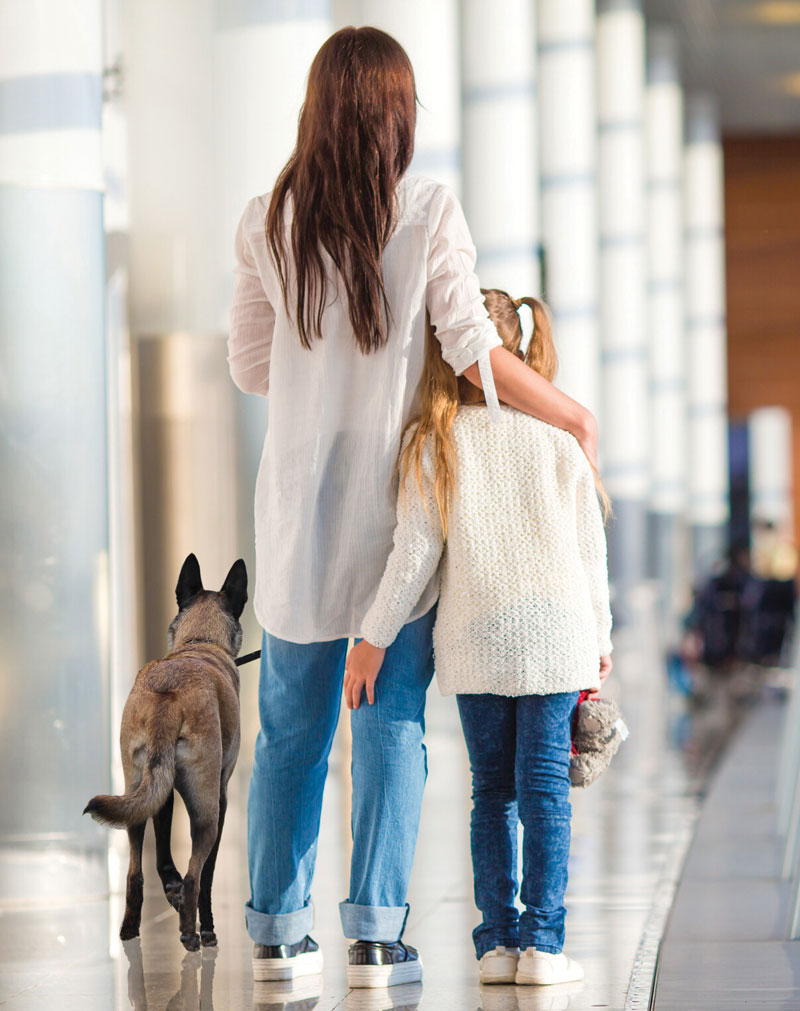Pet-Friendly Domestic Violence Shelters Help More Victims to Safety
Posted on October 1, 2021 By Editor Animal House, Columns


October is National Domestic Violence Awareness Month and abuse victims with pets are much more likely to seek help, escape a dangerous situation and leave their abuser, if they can bring their pet.
Only approximately 12% of domestic violence shelters accept victims who arrive with pets. Another 24% offer referrals to animal welfare organizations, according to the National Coalition Against Domestic Violence; many more pet-friendly programs are needed in every state.
In the U.S., roughly two-thirds of all households have at least one pet, according to the Animal Welfare Institute. That statistic combined with the fact that one of every three women and every four men will experience domestic abuse or violence, according to the National Domestic Violence Hotline, shows the critical need for more pet-friendly domestic abuse shelters and programs.
Abusers commonly threaten, mistreat or injure pets, children, seniors or other household members to maintain control of their victim. Victims may be current or former spouses or partners, or other family members. Domestic abuse and violence occurs in all zip codes, across all ages, genders, educational and economic levels, regardless of race, nationality or religion.
Northeast Florida has safe shelter options for domestic violence victims with pets: Jacksonville’s Hubbard House, Fleming Island’s Quigley House, Fernandina’s Micah’s Place, and St. Augustine’s Betty Griffin House. These domestic violence shelters provide temporary on or off-site housing options for victims’ pets. Some county animal control departments and humane societies also offer assistance or referral.
Shelters may co-house pets on-site, or partner with fosters, veterinarys and boarding kennels to temporarily house pets until they can be safely reunited with owners. These programs typically provide veterinary evaluation and any needed treatment for pets of domestic abuse victims.
Just as abusers prevent their human victims from seeking medical care, they also prevent veterinary care for family pets. Abusers know that physicians or veterinarys and staff recognize signs of abuse and will contact police. They also do not want victims to have any opportunity to ask, message or signal for help.
Domestic abuse experts state that victims often delay, or never leave their abusers because of concerns for the safety of pets left behind. In August 2021, approximately half (48%), of domestic violence victims said they would remain in abusive circumstances if they could not bring their pet to shelter with them, according to information gathered by Purina’s Purple Leash Project and RedRover Relief programs. For victims of domestic violence, their pets provide unconditional love, emotional support, comfort, companionship, stability and hope for a normal, safe future.
More than 70% of women in domestic violence shelters have reported that their abuser threatened, injured or killed a pet they had to leave behind. Abusers are well aware of the close bond between their victim and pets. They effectively exploit that bond to control, manipulate, frighten or punish their victim.
Purina’s Purple Leash Project, founded in 2019, uses purple to represent domestic violence awareness and a leash to symbolize the unbreakable bond between pets and owners. The project’s mission is to help keep people and pets together during life crises.
Purina has partnered with the nonprofit RedRover animal emergency rescue organization to create more pet-friendly domestic violence shelters, with at least one in every state and a greater goal of at least 25% of U.S. shelters designated pet-friendly by 2025. Both organizations work to secure federal resources and fund grants for domestic abuse shelters to develop pet policies, foster, kennel and veterinary networks.
RedRover, a nonprofit since 1987, established Relief and Safe Housing Programs to provide grants for domestic violence shelters to build their own pet housing or partner with local organizations. RedRover has funded approximately fifty pet-housing programs at family violence shelters. RedRover’s Mission is to help bring owners and pets out of crisis and into care, so they can heal and recover together.
The American Society for Prevention of Cruelty to Animals (ASPCA), reported that one in four domestic violence survivors said they had returned to an abusive partner, out of concern for a pet left behind. The National Coalition Against Domestic Violence reported that domestic violence victims have been known to live in their cars for up to four months, until an opening became available at a pet-friendly safe house or shelter.
The 2020-2021 pandemic lockdown that resulted in long-term at-home, remote work and school, created new domestic abuse situations. Likewise, existing violent or abusive home environments became even more dangerous for victims, families and pets, according to Jennifer Hobgood, ASPCA Senior Director of State Legislation/Southeast Region.
“He told me that if I did not come home and drop the divorce, he would take our big dog downtown and turn him in to the pound,” she said. “…and when I refused to come back, but said that I would pick up the dog and find a friend to keep him for me until I could get housing that allowed pets, he then told me that it would be so sad if our little chihuahua accidentally fell into the river.” This resident of Avondale shared her story of threats made against her family pets during a bitter separation and divorce, but asked to remain anonymous.
In 2018 the bipartisan Pet & Women Safety Act (PAWS), was passed to prevent threats or violence against the pets of domestic abuse victims. It also established a grant program for organizations that provide emergency and transitional shelter and housing assistance for domestic violence survivors to care for pets, service and emotional support animals, including horses. It added new law enforcement tools that strengthened the legislation.
Because no domestic abuse victims should have to choose between their safety or the safety of pets if escape is necessary, more than two-thirds of states have passed legislation to allow judges to include pets in domestic violence protection orders, including Florida. A new law, SB 1082, took effect July 1, 2020. That law allows Florida judges to include pets in restraining orders against domestic abusers, so pets may remain with victims. Advocates say their job now is to ensure that domestic violence victims understand legal protections for their pets and how to locate pet-friendly shelters.
Jacksonville’s Hubbard House was founded in 1976 and provides safe shelter for domestic abuse victims, families and pets. They are a certified domestic violence center that has answered more than 101,500 hotline calls and sheltered more than 42,900 victims and families.
Hubbard House partners provide safe, off-site shelter for the pets of survivors who are staying at the emergency center. Basic veterinary evaluation and necessary care are also provided for pets.
“We never want anyone to stay in a dangerous situation because they have a pet they are afraid to leave behind,” Dr. Gail Patin said. “We fully recognize and honor the fact that pets are part of the family, whether it’s a cat, dog or other kind of pet. If someone needs to flee for safety, pets need to come too. If left behind, pets may be neglected or worse. Hubbard House has its own holistic program that is educational and comprehensive. It’s called SPEAK for Pets Project (Shelter, Protection, Education, Advocacy & Kinship for Pets). We work with RedRover, Jacksonville Humane Society, or we arrange to place pets with partner fosters or veterinarys free-of-charge while victims are in our shelter. Pets receive vaccines, spay, neuter or preventive veterinary care while waiting to be reunited with their owners.” Dr. Patin is Hubbard House CEO.
“Hubbard House is only here because of the support of the Jacksonville community and our belief is that every person has the right to live violence-free. We’re thankful for this caring community and its support,” she said. “We have volunteer opportunities for individuals and groups and there is a list of needed items on our website, especially food and hygiene item donations.”
Experts recommend that if a domestic abuse victim has a plan to leave the abuser and take a pet, it is important to: have pet vaccinations and licenses in the victim’s name to establish ownership; bring any pet vaccinations and medical records, pet license or other documents; if necessary to retrieve pets from the abuser, request help from animal care and control officers or law enforcement. Never attempt to reclaim pets alone from an abuser or a dangerous situation.
Hubbard House will host the 27th Annual Barbara Ann Campbell Memorial Breakfast in memory of Barbara and all those who have died as victims of domestic violence, on October 5, 2021, at the Hyatt Regency Jacksonville Riverfront, 225 East Coastline Drive, from 7:30 a.m. – 9:00 a.m. Tickets are $50. Sponsorships start at $500.
By Julie Kerns Garmendia
Resident Community News




 (No Ratings Yet)
(No Ratings Yet)Annual Barbara Ann Campbell Memorial Breakfast, Hubbard House, National Domestic Violence Awareness Month, Purina, Purina’s Purple Leash Project, RedRover





